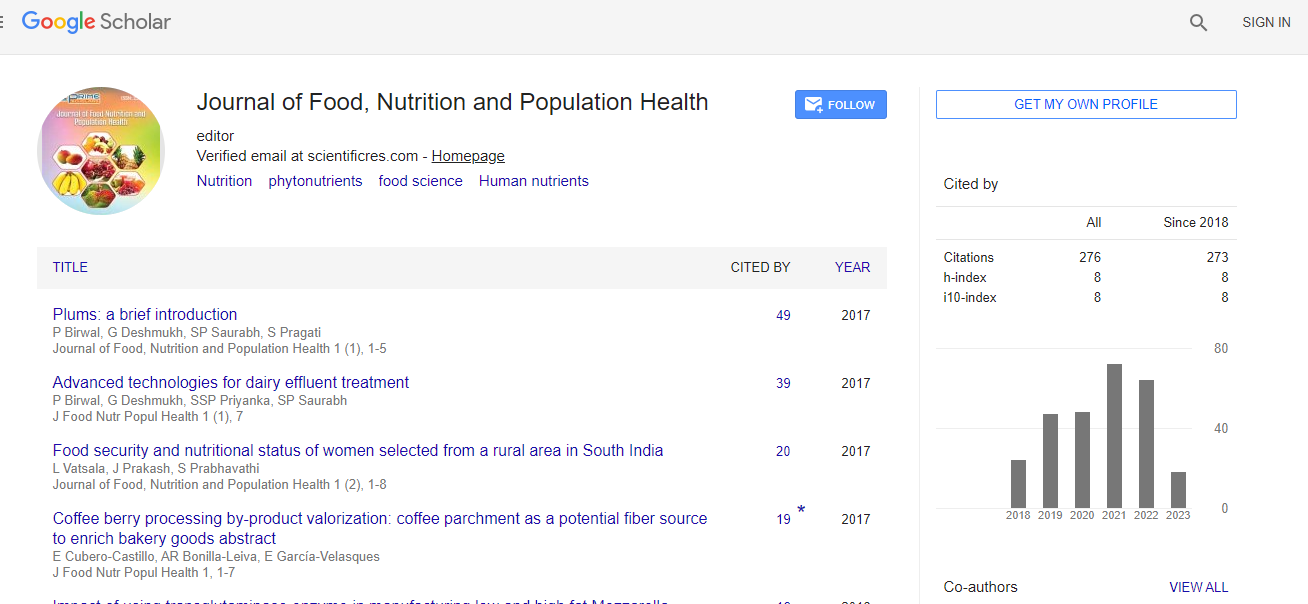Commentary - (2024) Volume 8, Issue 2
The Role of a Sustainable Diet in Promoting Human and Planetary Health
Oliver Martin*
Department of Agricultural Sciences, North West University, South Africa
*Correspondence:
Oliver Martin,
Department of Agricultural Sciences, North West University,
South Africa,
Email:
Received: 29-May-2024, Manuscript No. IPJFNPH-24-20865;
Editor assigned: 31-May-2024, Pre QC No. IPJFNPH-24-20865 (PQ);
Reviewed: 14-Jun-2024, QC No. IPJFNPH-24-20865;
Revised: 19-Jun-2024, Manuscript No. IPJFNPH-24-20865 (R);
Published:
26-Jun-2024, DOI: 10.21767/2577-0586.8.2.19
Introduction
In recent years, the concept of sustainability has transcended
its traditional environmental connotations to encompass
broader implications for human well-being. One of the most
critical arenas where sustainability intersects with health is in
our dietary choices. As global concerns over climate change,
biodiversity loss, and food insecurity intensify, the need for
adopting sustainable diets has never been more pressing. This
article explores what constitutes a sustainable diet, its impact
on both human health and the environment, challenges in
adoption, and the pathways towards promoting sustainable
eating habits globally. A sustainable diet can be defined as a
pattern of eating that promotes both human health and the
health of the planet. It takes into account the environmental
impact of food production, including greenhouse gas emissions,
water and land use, biodiversity loss, and the sustainability
of fish stocks. At the same time, it emphasizes nutritional
adequacy, cultural acceptability, and economic accessibility for
all populations. Emphasizing fruits, vegetables, legumes, nuts,
and seeds reduces the environmental footprint compared to
animal-based foods. Consuming whole grains over refined
grains supports sustainable agriculture and provides essential
nutrients. Choosing plant-based proteins like beans, lentils, and
tofu reduces greenhouse gas emissions and land use compared
to animal proteins.
Description
Opting for sustainably sourced fish and seafood, and smaller
portions of lean meats, poultry, and dairy products, minimizes
environmental impact. Supporting local farmers reduces
transport emissions and promotes regional biodiversity. Plantbased
diets rich in fruits, vegetables, and whole grains provide
essential vitamins, minerals, and fibre. Lower consumption of
red and processed meats is associated with reduced risks of
cardiovascular diseases, diabetes, and certain cancers. Plantbased
diets are often lower in calories and saturated fats,
supporting healthy weight maintenance. High fibre content
from plant-based foods promotes a healthy gut microbiome.
Plant-based diets have a lower carbon footprint compared
to diets rich in animal products, particularly beef and lamb.
Plant-based foods require significantly less water and land for
production compared to animal agriculture. Reduced demand
for intensive farming practices helps preserve biodiversity and
ecosystems. Reduced consumption of animal products reduces
the pressure on forests for agricultural expansion. Despite
the compelling reasons to adopt sustainable diets, several
challenges hinder widespread adoption.
Conclusion
Many people are unaware of the environmental impact of
their dietary choices or the benefits of transitioning to more
sustainable options. To overcome these challenges and
promote sustainable eating habits worldwide, concerted
efforts are needed across multiple fronts. Governments can
implement policies that incentivize sustainable agricultural
practices, promote local food systems, and provide nutritional
education. Public campaigns and educational programs can
raise awareness about the environmental and health benefits
of sustainable diets. Collaboration among stakeholders from
farmers and food producers to retailers and consumers is
essential to transform food systems towards sustainability.
Continued research into sustainable agriculture, food
technologies, and dietary patterns can inform evidence based
policies and practices.
Acknowledgement
None.
Conflict Of Interest
None.
Citation: Martin O (2024) The Role of a Sustainable Diet in Promoting Human and Planetary Health. J Food Nutr Popul Health. 8:19.
Copyright: © 2024 Martin O. This is an open-access article distributed under the terms of the Creative Commons Attribution License, which permits unrestricted use, distribution, and reproduction in any medium, provided the original author and source are credited.

